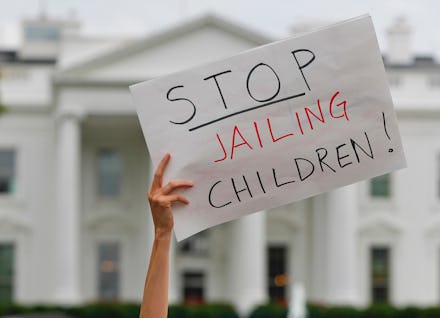Trump's family separation policy was just as traumatic for immigrant kids as we feared

It turns out that forcibly separating toddlers from their parents for indeterminate amounts of time is precisely as damaging as we imagined.
A report from a federal watchdog released Wednesday confirmed that President Trump's family separation policy last year resulted in "intense trauma" for the affected children. The "zero tolerance" rule, announced by former Attorney General Jeff Sessions last April, resulted in the separation of at least 2,500 children from their parents due to the government's pledge to prosecute all illegal border crossings. That required adults to be detained separately from their children so that they could be held for criminal proceedings without violating the so-called Flores agreement, a settlement that prohibits the indefinite detention of minors.
Government officials collected testimonies from roughly 100 mental health clinicians who had "regular interaction" with immigrant children who were detained in one of 45 government facilities, as well as other staff assigned to those facilities. Their findings revealed that separated children "exhibited more fear, feelings of abandonment, and post-traumatic stress than children who were not separated," per The Associated Press.
Contributing to the children's trauma was the fact that they often were unaware of what was happening to their parents. In the case of one 7- or 8-year-old boy, AP reports, he had no idea what had happened to his father and eventually "believed that his dad was killed and he would also be killed." The child "ultimately required emergency psychiatric care to address his mental health distress," the report states.
Other children reported physical symptoms that had no identifiable cause. "You get a lot of 'my chest hurts,'" one facility medical director reported. "Children describe symptoms, 'Every heartbeat hurts,' 'I can't feel my heart,' of emotional pain." Some cried "inconsolably," while others were catatonic or distant upon being reunited with their parents due to the psychological turmoil they experienced.
The damage was compounded by the fact that the government had no set process for reuniting minors with their parents. The longer children remained in government custody, the "more their mental health deteriorated," AP reports. Meanwhile, staff were unable to keep up with the increased need for mental health care; in some facilities, one mental health clinician was responsible for the care of more than 25 children.
The report, which was compiled by the Department of Health and Human Services' inspector general's office, was based on interviews conducted through August and September of 2018 — when some 9,000 children were in the custody of government shelters. It set forth six concrete recommendations for the government to implement, including better training for facility staff to be able to identify trauma in children and provision of more and better therapeutic resources for the kids most in need.
After intense public pressure, President Trump signed an executive order ending implementation of the zero tolerance policy last June after previously insisting that only Congress could act to end the rule he had chosen to enforce. But rather than prioritize humane treatment of migrants and asylum-seekers, last month the administration moved to amend the Flores rule in order to possibly enable indefinite detention for whole families.
Meanwhile, the inspector general's final recommendation? "Take all reasonable steps to minimize the time that children remain in [government] custody."